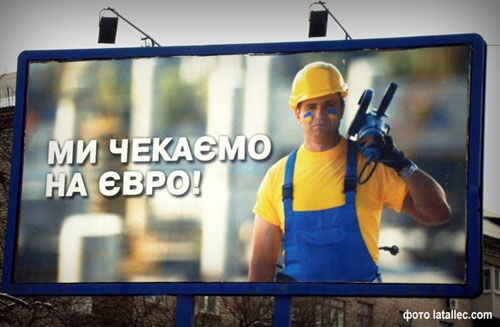
Racism and Xenophobia in Ukraine During Euro 2012
Publication: Eurasia Daily Monitor Volume: 9 Issue: 110
By:

Ukraine, which with Poland co-hosts the Euro 2012 football championship from June 8-July 1, has been lambasted for corruption and racism. Widespread reports have focused on Ukraine spending more than Poland on Euro 2012 even though its GDP per capita is four times smaller and wages much lower. The US Department of State’s 2011 country report on Ukraine, released last month, misleadingly claimed that “Spray-painted swastikas were a common sight throughout Kyiv” (https://www.state.gov/j/drl/rls/hrrpt/humanrightsreport/index.htm#wrapper).
Responding to a May 29 BBC Panorama documentary on anti-Semitism and racism among Polish and Ukrainian football fans, Ukrainian Ministry of Foreign Affairs spokesperson Oleh Voloshyn complained that “as far as racism is concerned, European Union member countries are a long way ahead of Ukraine” (Interfax Ukraine, May 29). Voloshyn discounted the possibility of racist violence saying, “I am sure that nothing is going to happen – we all should calm down and return to reality” (www.mfa.gov.ua, May 30). The West’s blanket labeling of Ukrainian society as racist, coupled with Ukraine’s unwillingness to address actual problems of intolerance in the country have led to a fundamental obstacle in closer European-Ukrainian relations and may ultimately contribute to blocking the country’s accession to the EU.
Western prejudice toward the “East,” expressed as concern over racism, has a long history and leads to Ukraine not being perceived as “European” in Germany and elsewhere in Western Europe. Although racism and anti-Semitism is, according to evidence collected by the East Europe Monitoring Center and as shown in the BBC Panorama program, more prevalent in Poland than Ukraine, it is the latter that has borne the brunt of Western prejudice (Kyiv Post, May 31). Nobody doubts Poland’s European credentials, while Ukraine was described in May alongside Belarus as a “dictatorship” by German Chancellor Angela Merkel.
Stereotypical attitudes toward Ukraine have sharpened since 2011 after the sentencing of Yulia Tymoshenko and since April when pictures were widely circulated of bruises on her body allegedly committed by prison guards. Selective use of justice and democratic regression in general deepen perceptions in Brussels and Washington that Ukraine is not a member of the European family of nations. Great Britain, France, Germany, the EU and other European countries are boycotting the Ukrainian portion of Euro 2012 (Kyiv Post, June 11). French President Francois Hollande has demanded that all government members, including the sports minister, not attend Euro 2012 matches in Ukraine. Similarly, 14 out of 20 heads of state boycotted the May summit of Central European leaders in Yalta, leading to its cancellation.
At the same time, there is an unwillingness in Ukraine to acknowledge the problem of racism and anti-Semitism, which “fails to outrage the population.” “Few denounce incidents” and “politicians fail to condemn racism” (Kyiv Post, May 31). Racist crimes in Ukraine are rarely prosecuted and fall under the rubric of “hooliganism,” which provides for lenient criminal charges.
Racist and anti-Semitic crimes often go unreported because two thirds of Ukrainians do not trust the police and courts (Ukrayinska Pravda, May 5). There are widespread fears of police racism, corruption and brutality (https://www.coe.kiev.ua/projects/doc/UkraineREPORT-fin.pdf, https://www.state.gov/j/drl/rls/hrrpt/humanrightsreport/index.htm#wrapper). Amnesty International’s Ukraine expert said that while “people of color are not equal” in Ukraine, the police might be more of a threat to foreign visitors than football hooligans because they are corrupt and intolerant (news.kievukraine.info, June 10).
With tolerance in decline in Ukraine during the last decade, the Council of Europe’s European Commission on Racism and Intolerance (ECRI) “remains concerned by the phenomenon of racist violence in Ukraine.” Five months ahead of Euro 2012, the ECRI encouraged the Ukrainian authorities “to pursue and intensify their efforts to combat racism in football” and “step up their efforts to raise awareness about the dangers of racism in sport” (https://www.coe.int/t/dghl/monitoring/ecri/library/publications_en.asp; Kyiv Post, February 21).
Ukraine’s ability to combat racism and anti-Semitism has eroded under President Viktor Yanukovych after three state institutions were disbanded.
The State Committee on Nationalities and Religion (SCNR) had coordinated the work of the Inter-Agency Working Group (IAWG) to Combat Xenophobia and Ethnic and Racial Intolerance, which had successfully brought together state institutions, government departments and civil society NGOs. The IAWG had adopted a “Plan of Action to Combat Xenophobia and Racial and Ethnic Discrimination in Ukrainian Society” for the period 2008-2009 and 2010-2012, with only the first implemented. Both agencies were recently closed (Kyiv Post, February 21). The ECRI reported, “it remains the case that there is no body in Ukraine that is clearly and specifically entrusted with combating racism, racial discrimination, xenophobia, anti-Semitism and intolerance.”
A third important institution that was closed was the Human Rights Monitoring department in the Interior Ministry (MVS), which has been a setback to the development of a uniform system of monitoring racist incidents and neo-Nazi and skinhead groups. The MVS department and IAWG brought together civil society NGOs and state institutions and government departments. The closure of the SCNR and Working Group, “created a vacuum in the responsibilities for leading this work,” the ECRI believed.
Most reports focus on extreme right-wing Ukrainian nationalism in Galician western Ukraine where the Svoboda (Freedom) party is popular. In fact, racial intolerance, xenophobia and anti-Semitism are more prevalent in eastern and southern Ukraine and the Crimea. Secret recordings made in President Leonid Kuchma’s office by presidential guard Mykola Melnychenko reveal that the President and Nikolai Azarov, then head of the State Tax Administration and since 2010 Prime Minister, spoke in anti-Semitic, xenophobic and anti-American/Western terms (transcripts: www.kyivpost.com/news/nation/detail/6379/, https://www.kyivpost.com/news/nation/detail/8647/). The Yanukovych campaign unleashed a massive anti-American campaign in the 2004 elections and he, together with Kuchma, continues to believe the 2000 Kuchmagate scandal and 2004 Orange Revolution were conspiracies by US intelligence services (see EDM, October 7, 2004).
Leaked US embassy cables from Kyiv and the US State Department’s 2011 report on Ukraine reported that neo-Nazi and skinhead groups are most active in Kyiv, eastern Ukraine and the Crimea (https://wikileaks.org/cable/2008/11/08KYIV2323.html, https://wikileaks.org/cable/2008/12/08KYIV2441.html#; https://www.state.gov/j/drl/rls/hrrpt/humanrightsreport/index.htm#wrapper). The football team Kharkiv Metalist’s extremist fans were shown on the BBC documentary attacking Asian students in the stadium while the police looked on (https://www.kyivpost.com/news/nation/detail/128462/).
In the 2006 Crimean elections, the Party of Regions signed an alliance with Crimean Russian nationalists to form a For Yanukovych! bloc. Current Crimean Prime Minister Anatoliy Mogilyov is well-known for his xenophobic attitudes and was named the “2012 Enemy No.1 of the Ukrainian Media” by the Independent Media Trade Union and Institute of Mass Media. Writing in Krymskaya Pravda, Mogilyov supported Joseph Stalin’s ethnic cleansing of the Crimean Tatars because they were allegedly “Nazi collaborators” (https://blogs.pravda.com.ua/authors/kuzyo/4edabbffaa116/). Communist Party of Ukraine leader Petro Symonenko supported Stalin’s ethnic cleansing of the Tatars during a debate on Tatars in the Ukrainian parliament (Ukrayinska Pravda, May 16).
The ECRI condemned the fanning of anti-Tatar discourse by local Crimean authorities and anti-Tatar “hate speech” and stated: “As noted elsewhere in this report, anti-Tatar sentiment remains an issue in Ukraine and appears to have increased in recent years as politicians’ rhetoric has given it a semblance of respectability” (https://www.coe.int/t/dghl/monitoring/ecri/library/publications_en.asp). Lack of Ukrainian action to combat racism and xenophobia deepens perceptions in the Council of Europe and the EU of Ukraine as not “European.”
Five years ago, when Euro 2012 was awarded to Ukraine, it was meant to showcase Ukraine as a European country; but this has not happened. Selective use of justice, as applied against Tymoshenko, and attacks on democracy have already deepened Western stereotypes about Ukraine as not being “European.” In the approach to Euro 2012, media coverage of Ukraine has focused on high level corruption surrounding the government-funded projects that were all awarded to Donetsk companies, as well as racism in Ukrainian football. Boycotts by EU leaders could lead to the risk that the Ukrainians are throwing a party nobody wants to attend.




